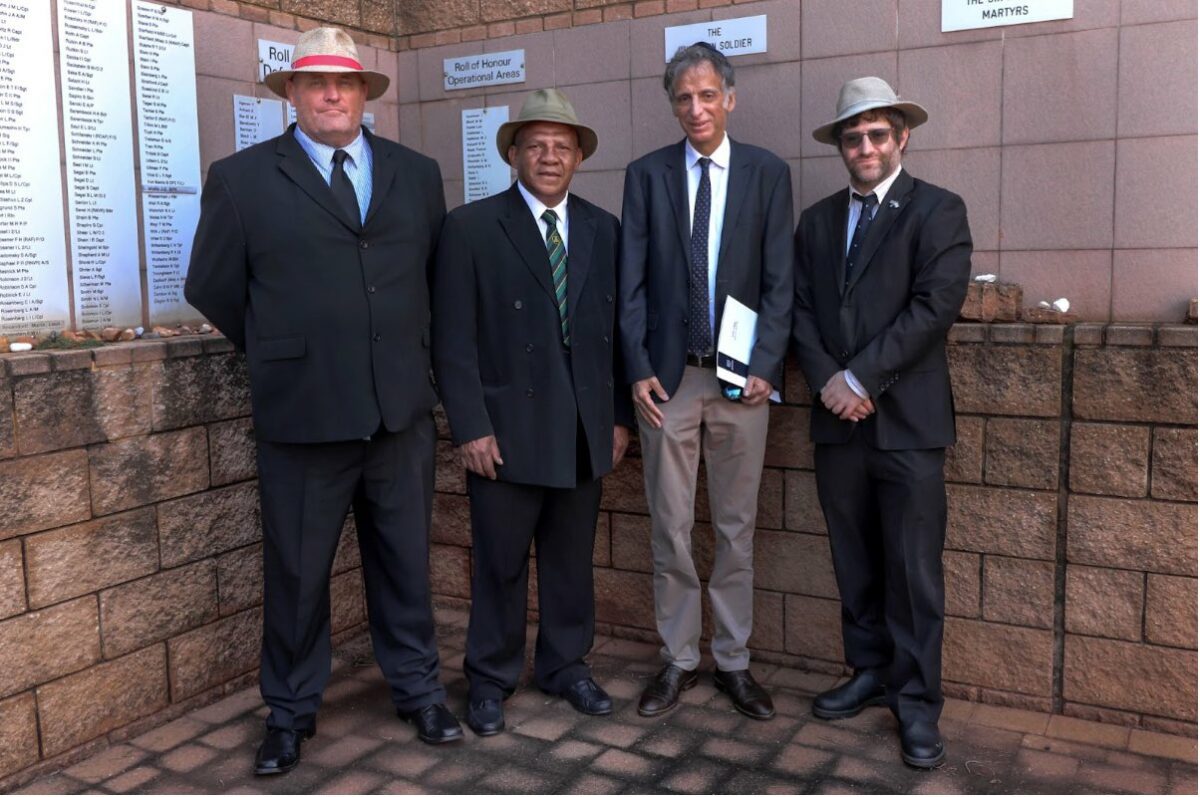A unique ceremony was held at the South African National Jewish War Memorial at West Park Jewish Cemetery last week. During this ceremony, the South African Jewish community honoured soldiers who made the ultimate sacrifice in the two World Wars. The ceremony was held by the Jewish Ex-Service League, and was supported by the South African Zionist Federation.
Three separate contributions were memorialised at the event.
Cape Corps’ role in liberating Jerusalem from the Ottoman Turks in World War I
South Africa’s legendary Cape Corps, made up of members of the Coloured community, played an important role in liberating Jerusalem from the Ottoman Turks, who had occupied much of the Middle East for centuries. At the Battle of Megiddo, some 52 members of the Cape Corps – Christians and Muslims – lost their lives in helping to open up the way to Damascus and the creation of the British Mandate. They are buried in Mount Scopus in Jerusalem. Field Marshal Viscount Allenby, the British Commander, later lauded the men of the 1st Cape Corps, saying they had “covered themselves with glory, displaying a bravery and determination that has never been surpassed”.
A plaque honouring these brave men was unveiled by Commander M Adeel Carelse MMM (Rtd), whose grandfather, Cpl. C. H. Carelse, was awarded the Distinguished Conduct Medal for his actions during the battle. Commander Carelse reminded the audience of the discrimination to which members of Cape Corp were subjected because of the racial attitudes of the South African government at the time, despite the fact that they were fighting for their country. He also shared the story of an unknown historical figure, Joe Seratzky – a Jewish man from Johannesburg who volunteered with the Cape Corps and fought alongside the Coloured community. Johannesburg City Councillor, Vasco Da Gama, whose grandfather fought in the battle, addressed the audience. He traced the proud history of the Cape Corp from its earliest inception saying “The history of the Cape Corp’s contribution to South Africa is important to remember”.
It was announced at the ceremony that a memorial for the Cape Corp would be erected in Israel.
644 Southern African volunteers on the SS Erinpura
In May 1943, 644 members of the African Auxiliary Pioneer Corps including a number of Tswana, Sotho, and Swazi soldiers, as well as 140 Jewish soldiers of 462 Transport Company of the British Army, died when the ship transporting them, the SS Erinpura, was bombed by the Nazis. The two groups had been working together on a British army logistics project on the coast of Haifa for the war effort.
Israel’s Ambassador to South Africa, His Excellency, Eliav Belotsercovsky, unveiled a plaque in memory of these brave men to complement the SS Erinpura Memorial on Mount Herzl in Jerusalem.
Cornerstone honouring South African Jews who fought in World War I
In 1922, Field Marshal, Jan Smuts, South Africa’s Prime Minister and architect of the League of Nations, unveiled a stone at the old Jewish Guild War Memorial building in the Johannesburg CBD, marking the contribution of South African Jews who fought in the Great War. When the building was abandoned, the stone was transported to various places. Thanks to the work of the Jewish Ex-Service League it will now find a permanent home at West Park. It was unveiled in its new home by Gareth Shackleford, General Smuts’ great-grandson.
General Smuts was a lifelong friend of Chaim Weizmann, who is known as the father of Zionism, and played a pivotal backroom role in the drafting of the Balfour Declaration, and the ultimate passing of the United Nations resolution that brought Israel into being.
Members of the South African Ex-Service League explained the importance of each of the unveiled plaques. The reading of the soldiers’ prayers followed.
“History is full of fascinating but little-known people and events that nevertheless played a role in shaping today’s world,” says Benji Shulman of the South African Zionist Federation, which hosted the event. “This was a unique opportunity to reconsider the many ways in which South African and Israel are connected—and perhaps even reconsider how we build on that connection to support up with just and sustainable solutions to the current problems in the Middle East.”

